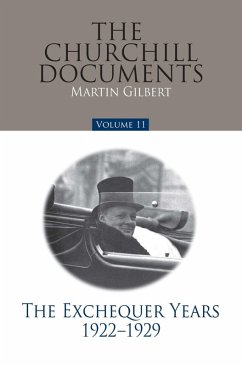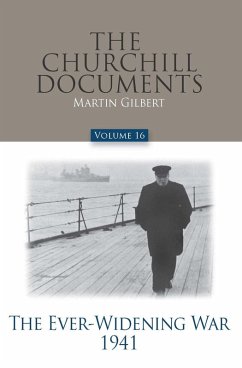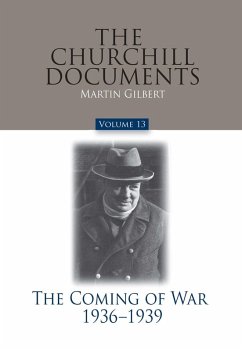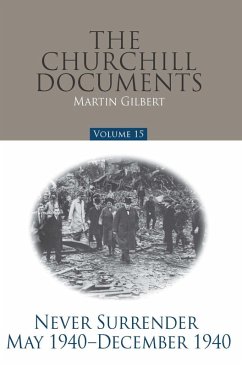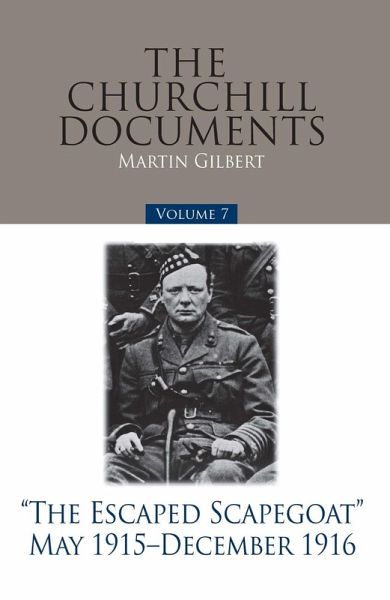
Churchill Documents - Volume 7 (eBook, ePUB)
The Escaped Scapecoat: May 1915-December 1916

PAYBACK Punkte
8 °P sammeln!
The letters and documents reproduced in the seventh volume of The Churchill Documents span the period from May 1915 to December 1916. During this time, Winston Churchill was successively Chancellor of the Duchy of Lancaster, a member of the Cabinet, and a battalion commander on the Western Front. This volume includes every letter written by Churchill to his wife from the trenches. Returning from the Western Front as a Member of Parliament holding no office, Churchill was a vigorous opponent to the government's war policy, critical of the Somme offensive and of the lack of munitions preparation...
The letters and documents reproduced in the seventh volume of The Churchill Documents span the period from May 1915 to December 1916. During this time, Winston Churchill was successively Chancellor of the Duchy of Lancaster, a member of the Cabinet, and a battalion commander on the Western Front. This volume includes every letter written by Churchill to his wife from the trenches. Returning from the Western Front as a Member of Parliament holding no office, Churchill was a vigorous opponent to the government's war policy, critical of the Somme offensive and of the lack of munitions preparation.
"What about the Dardanelles?" was the cry Winston Churchill was to hear often between the two world wars. It epitomized the distrust in which he was widely held as a result of the eventual failure of the Gallipoli expedition. Although, as the documents in this volume make clear, that campaign was the full ministerial responsibility of the Secretary of State for War, Lord Kitchener.
In the writing of the official biography of Sir Winston Churchill, Randolph Churchill-and later Sir Martin Gilbert, who resumed the work following Randolph's death-had full access to Sir Winston's letters and papers, and also many hundreds of private archives. The work spans eight volumes, detailing Churchill's youth and early adventures in South Africa and India, his early career, and his more than fifty years on the world stage. No other statesman of modern times-or indeed of any age-has left such a wealth of personal letters, such a rich store of private and public documentation, and such vivid memories in the minds of those who worked closest to him. Through these materials, assembled over the course of more than twenty years, one is able to know Churchill in a way never before possible. Churchill's personal papers are so extensive that it was only possible to include in the narrative volumes a part of the relevant documents. The volumes titled The Churchill Documents run parallel with the narrative volumes, and with them form a whole. The letters, documents, and correspondence contained within are drawn from the Churchill Papers, now at Churchill College, Cambridge, and from many other archival sources, both private and public.
"What about the Dardanelles?" was the cry Winston Churchill was to hear often between the two world wars. It epitomized the distrust in which he was widely held as a result of the eventual failure of the Gallipoli expedition. Although, as the documents in this volume make clear, that campaign was the full ministerial responsibility of the Secretary of State for War, Lord Kitchener.
In the writing of the official biography of Sir Winston Churchill, Randolph Churchill-and later Sir Martin Gilbert, who resumed the work following Randolph's death-had full access to Sir Winston's letters and papers, and also many hundreds of private archives. The work spans eight volumes, detailing Churchill's youth and early adventures in South Africa and India, his early career, and his more than fifty years on the world stage. No other statesman of modern times-or indeed of any age-has left such a wealth of personal letters, such a rich store of private and public documentation, and such vivid memories in the minds of those who worked closest to him. Through these materials, assembled over the course of more than twenty years, one is able to know Churchill in a way never before possible. Churchill's personal papers are so extensive that it was only possible to include in the narrative volumes a part of the relevant documents. The volumes titled The Churchill Documents run parallel with the narrative volumes, and with them form a whole. The letters, documents, and correspondence contained within are drawn from the Churchill Papers, now at Churchill College, Cambridge, and from many other archival sources, both private and public.
Dieser Download kann aus rechtlichen Gründen nur mit Rechnungsadresse in A, B, BG, CY, CZ, D, DK, EW, E, FIN, F, GR, HR, H, IRL, I, LT, L, LR, M, NL, PL, P, R, S, SLO, SK ausgeliefert werden.





